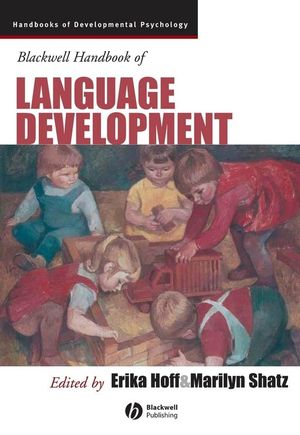Blackwell Handbook of Language DevelopmentISBN: 978-1-4051-3253-4
Hardcover
480 pages
January 2007, Wiley-Blackwell
 This is a Print-on-Demand title. It will be printed specifically to fill your order. Please allow an additional 15-20 days delivery time. The book is not returnable.
Other Available Formats: Paperback
|
||||||
"Catapulting us full-speed into the twenty-first century, the
'Blackwell Handbook of Language Development' offers a
stunning vista on contemporary knowledge about language development
in our species. The mystery of the child's linguistic mind is laid
bare while thoroughly explaining the important social and cognitive
contexts in which it grows. The edition's eminent editors, Hoff and
Shatz, offer brilliant insights, theoretical notes, and historical
views that give depth and urgency to the field's looming modern
questions, and the text's contributors are an international
tour-de-force whose ingenious research provide a new look on the
magic of human language learning. Fascinating accounts of language
development in infancy, early childhood, later childhood, the
bilingual child, and atypical language development are included.
This must-read text will interest scholars, students, and
professionals, alike, and will utterly satisfy all those who have
ever marveled at the beauty of language or wondered about how our
magnificent human mind discovered and learned it."
Laura-Ann Pettito, Dartmouth College
Laura-Ann Pettito, Dartmouth College
"Hoff and Shatz have gathered an important and lively set of new
articles on child language learning with broad topical coverage,
and considerable attention to foundational issues as well as recent
empirical findings. Diverse points of view are well represented and
explained. This collection would certainly be my choice as a text
for advanced courses and seminars on language acquisition."
Professor Lila Gleitman, University of Pennsylvania
“The authors … have risen to the monumental
challenge of charting language development … .The book
successfully captures the complexities of language development
across time.”
Canadian Psychology



